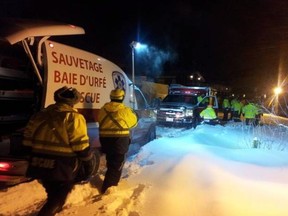Sauvetage Baie-d'Urfé Rescue is about volunteering on the front lines
Sauvetage Baie-d'Urfé Rescue is on the lookout for new recruits who fancy volunteering their services on the front line.

Article content
As a member of the Sauvetage Baie-d’Urfé Rescue squad you could be called upon to pump out a flooded basement, search for a lost child in the forest, welcome a refugee family at the airport, offer first aid at a sports event or help local police with traffic management.
Call it front-line volunteerism.
The rescue squad celebrated its 10th anniversary in 2016 and is on the lookout for new recruits.
“If you like public service, this is the type of thing you might like to do,” squad Captain (Administration) Anthony Brown said. “I am so grateful. This work has opened up a whole world to me.”
The Baie-d’Urfé rescue squad was fashioned after Sauvetage Pointe-Claire Rescue, which was established in 1951.
The squad’s executive is headed by director Wayne Belvedere and Captain George Motz. Currently, only three of the 21 squad members are women. Brown said they would be especially keen on welcoming mothers.
“We recently worked a big event — a run — for the Lester B. Pearson School Board and there were a number of (students) who needed to be treated for small things,” Brown said. “Children tend to talk more easily with moms.”
Close to 3,540 volunteer hours were logged in 2016.
The squad is on call in the evening, after the town’s public works department shuts down for the day. Calls for help are answered by dispatch in Pointe-Claire, which then contacts the volunteer Baie-d’Urfé night-watchman on duty. He directs the call to either the squad director or captain who then contacts the necessary team members.
Spring was hectic, as it was for so many volunteers in the West Island.
“We had 23 flooded homes in Baie-d’Urfé and I went to 18 of them,” Brown said. “We pumped out the water and when we could, we left fans. It was particularly heart-breaking when the home belonged to an elderly person. But it was good to meet them. We put them on a list so that if an evacuation is ever necessary, we know where they live.”
Search and rescue is another of the squad’s responsibilities. Last year, the Sûreté du Québec asked them to help search for three young brothers who had gotten lost in the Boucherville region. It turns out they were refugees who were getting bullied at school and had decided to run away. They were found.
There are three levels of training, beginning with two days of basic first aid, CPR and defibrillation training, followed by 60 hours of emergency first-responder training and then 80 hours of emergency medical-responder training. Squad members can choose how many levels they want to complete. Others join the squad with skills learned elsewhere, be it firefighting, nursing or wilderness training. And others work with the Coast Guard to complete their marine and advanced-marine emergency-responder training.
Two memorable operations for Brown were welcoming Haitian refugees at the airport following the 2010 earthquake and, more recently, greeting Syrian families, also at the airport.
“Some of the (Haitian) families were arriving with dust from the earthquake still on their clothes,” Brown said. “And it was the dead of winter.” Brown said he and other volunteers greeted 500 Syrian families — all arriving between midnight and 3 a.m. — again in the middle of winter.
The focus was on offering a helping hand and a friendly welcome.
The squad also did three weeks of night shifts in Pierrefonds-Roxboro during the flooding. The volunteers kept an eye on evacuated homes and helped supply struggling residents with the latest news from the authorities.
“It was go, go, go all through the night,” Brown said.
People interested in finding out more about becoming a member of the squad are invited to attend the weekly Wednesday practice held at the squad headquarters (300 Surrey St.) at 7 p.m. The next step is to fill in an application and complete a three-month probation, during which time the recruit only observes. The application is then voted on by the town council. Once approved, the recruit begins training.
For more information, visit www.sbdrs.ca






Postmedia is committed to maintaining a lively but civil forum for discussion. Please keep comments relevant and respectful. Comments may take up to an hour to appear on the site. You will receive an email if there is a reply to your comment, an update to a thread you follow or if a user you follow comments. Visit our Community Guidelines for more information.